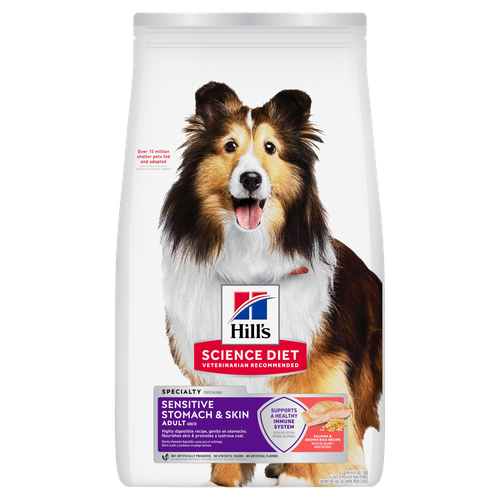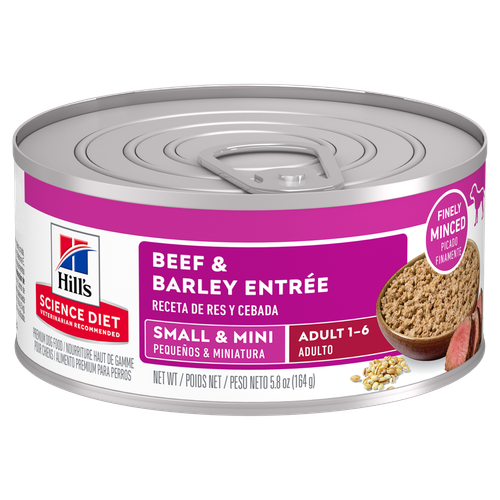
-
Find the right food for your petTake this quiz to see which food may be the best for your furry friend.Find the right food for your petTake this quiz to see which food may be the best for your furry friend.Featured products
 Adult Sensitive Stomach & Skin Chicken & Barley Recipe Dog Food
Adult Sensitive Stomach & Skin Chicken & Barley Recipe Dog FoodScience-backed nutrition tailored for skin and digestive health, packed with clinically proven, immune system supporting antioxidants.
Shop Now Adult Stomach & Skin Salmon & Brown Rice Recipe Dog Food
Adult Stomach & Skin Salmon & Brown Rice Recipe Dog FoodScience-backed nutrition tailored for skin and digestive health, packed with clinically proven, immune system supporting antioxidants.
Shop Now Chicken & Barley Entrée, Beef & Barley Entrée
Chicken & Barley Entrée, Beef & Barley EntréeChicken & Barley recipe and Beef & Barley recipe with precisely balanced nutrition to keep adult dogs active and healthy.
Shop NowFeatured products Senior Vitality Adult 7+ Tuna & Vegetables Stew
Senior Vitality Adult 7+ Tuna & Vegetables StewImproves Everyday Ability to Get Up & Go
Shop Now Adult 7+ Indoor Chicken Recipe Cat Food
Adult 7+ Indoor Chicken Recipe Cat FoodSupports energy level and beautiful fur in mature indoor cats
Shop Now Adult Turkey & Liver Entrée Cat Food
Adult Turkey & Liver Entrée Cat FoodPrecisely balanced nutrition with the delicious taste of minced turkey & liver to help fuel the energy needs of cats during the prime of their life
Shop Now -
Dog
- Dog Tips & Articles
-
Health Category
- Weight
- Food & Environmental Sensitivities
- Urinary
- Digestive
- Joint
- Kidney
-
Life Stage
- Puppy Nutrition
- Adult Nutrition
- Senior Nutrition
Cat- Cat Tips & Articles
-
Health Category
- Weight
- Skin & Food Sensitivities
- Urinary
- Digestive
- Kidney
-
Life Stage
- Kitten Nutrition
- Adult Nutrition
Featured articles How to Properly Mix Wet & Dry Pet Foods
How to Properly Mix Wet & Dry Pet FoodsAn Orange cat eating from a bowl filled with mixed food
Read More What Is Littermate Syndrome? Pet Adoption Guide
What Is Littermate Syndrome? Pet Adoption GuideLearn more about littermate syndrome in dogs and cats and how to successfully navigate adoption and early socialization processes.
Read More The Science Behind Our Love for Pets
The Science Behind Our Love for PetsLearn the scientific reasons why we have such strong connections with our pets, and what science says about the love between humans and our furry friends.
Read More -


Taking your dog to the vet regularly is essential at every life stage. It’s especially important when you first bring him home—puppies need a special set of exams and vaccinations, as do adopted dogs with an unknown history or existing medical conditions. As your dog ages, he’ll be more prone to develop illnesses and will require special treatment. At every stage of his life, regular dog health checks will be essential to his growth and development.
Puppy vet visits
When you get a puppy, one of the first things you should do is take him to the vet. Your puppy’s first vet visit will involve a physical exam, deworming, stool sample, and shots, but it will also involve educating you on how to take care of your friend. Make a list of questions for your vet before the visit, along with any sort of health information provided by the shelter, pet store, or breeder. He will also need to return for follow-up vaccinations a few weeks later.
What to expect
When your pup is fully grown, he will still need to visit the vet when he gets sick and for annual check-ups. A yearly visit is usually a good time for your vet to do a physical exam on your dog. This includes taking your dog’s temperature, weighing him, and checking his heart, lungs, stomach, teeth, eyes, ears, skin, and coat. It’s also important to maintain these yearly visits so that your vet can maintain knowledge and a relationship with your dog.
Other reasons to take your puppy to the vet
Outside of annual check-ups, there are several other reasons why you may need to take your dog to the vet. Because puppies are rambunctious little explorers, it’s possible they may encounter one or more of these common medical conditions including ear infections, urinary tract infections, bacterial infections, skin allergies, arthritis, and intestinal issues.
Also, make sure to document any abnormal signs you see in your puppy if you suspect that he might be sick so you can share with your veterinarian for an easier diagnosis. Remember to note when the symptoms began and if they began after a particular situation like playing outside or after eating something.
Another important reason to visit the vet is to spay or neuter your dog. Find out more about the health benefits of spaying and neutering, as well as what to expect during the procedure.


Tasty Tips
Tips for a productive visit
A trip to the vet can be a stressful experience for you and your dog. There will be lots of strange sights, smells, sounds, people, and animals that can distract or frighten him. Here are a few things you can do to plan for a comfortable visit:
- Play with him or take him for a walk before leaving for the vet. This will give him a chance to burn some nervous energy, as well as preventing a possible accident in the office.
- If your dog is small enough, consider taking him to the vet in a carrier. This will protect him from combative pets and vice versa, as well as make sure he doesn’t try to run away. If your dog is sick, this will give him a chance to rest. Also, throw in a blanket and toy that he is used to cuddling or playing with for familiarity to help keep him calm.
- Keep your dog calm in the waiting room. Though he may be excited to meet other animals, it’s best to keep him on your lap or by your side. Pet him frequently and talk to him softly to help keep him relaxed. When you get to the examination room, ask your vet if you can help hold your dog. Veterinarians and vet nurses are experienced at holding nervous and frightened animals, but it may be worth it if you think he’ll be more comfortable in your hands.
- Veterinary clinics and hospitals are often very busy. If you want extra time to talk to your vet, book a longer appointment or don’t visit during peak hours. Clinics are usually at their busiest in the early morning or early evening.
- Take your dog to the vet regularly to be weighed and checked. The more your vet sees your dog, the better they will be able to address his needs, and the more comfortable your dog will be at the clinic.
Also, be sure to ask your vet for advice on caring for your puppy’s health at home including proper nutrition, exercise, and grooming. Taking good care of your pup in between vet check-ups will help improve the likelihood a good visit and reduce the need for unexpected health checks.
Related products

Hearty beef paired with tender vegetables in a savory stew

Science Diet's breakthrough nutrition supports ultimate digestive well-being & healthy microbiome

Delicious roasted chicken paired with tender vegetables in a succulent stew

Delicious roasted chicken paired with tender vegetables in a succulent stew
Related articles

Your dog's coat and skin are a big part of your dog's overall health. Ensure you keep your dog's coat healthy, by following these simple tips.

Wondering where can I buy a dog? Consider adoption and explore the pros and cons of adopting a dog from a breeder versus an animal shelter.

Learn how to help keep your dog's immune system in tip-top shape, including nutritional immune system support for dogs and other strategies.

Discover how the field of dog science is giving us more and more insights into the inner workings of our furry best friends.

Put your dog on a diet without them knowing
Our low calorie formula helps you control your dog's weight. It's packed with high-quality protein for building lean muscles, and made with purposeful ingredients for a flavorful, nutritious meal. Clinically proven antioxidants, Vitamin C+E, help promote a healthy immune system.
Put your dog on a diet without them knowing
Our low calorie formula helps you control your dog's weight. It's packed with high-quality protein for building lean muscles, and made with purposeful ingredients for a flavorful, nutritious meal. Clinically proven antioxidants, Vitamin C+E, help promote a healthy immune system.


